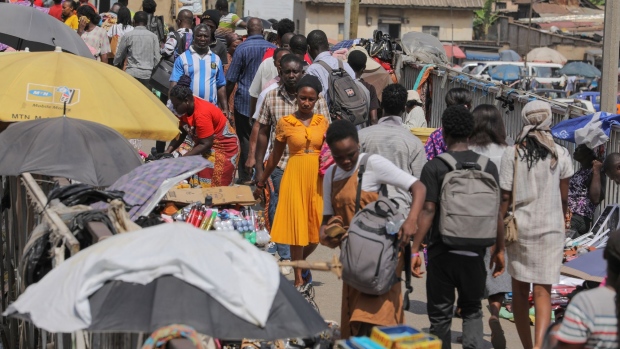Feb 7, 2023
Ghana Plans to Offer Delayed Bond Payments to Lure Pension Funds
, Bloomberg News

(Bloomberg) -- Ghana is preparing a new offer to entice local pension funds into its debt restructuring program, weeks after exempting them from participating in the plan, according to people with knowledge of the matter.
Unlike other holders of cedi-denominated government debt, pension funds will receive their full interest under the plan, but it will come over a longer period of time, said the people who asked not to be identified because they aren’t authorized to speak publicly on the matter.
In the swap affecting 137.3 billion cedis ($11.3 billion) of debt, bondholders face interest-payment haircuts, with coupon rates on government debt reduced to between 8.35% and 15%. That compares with an average coupon rate of 18.9% for 55 cedi-denominated sovereign bonds, according to data compiled by Bloomberg. The list excludes Treasury and cocoa bills, Treasury notes and sinkable bonds.
A finance ministry spokeswoman declined to comment when reached by phone. Thomas Esso, executive secretary of the Chamber of Corporate Trustees, did not respond to telephone calls and a text message seeking comment.
Private pension funds held about 5.5% of all domestic government bonds as of August, according to data from the Central Securities Depository Ghana Ltd. Those which accept the offer will likely have the same coupon rates as banks and insurers for now, the people said, meaning these would be capped at 10%. But the difference between the interest they would have accrued from the old and new bonds, will be converted into a new security that will be paid at maturity, the people said.
The government had earlier exempted pension funds from the debt swap after labor unions threatened to go on strike to preserve their members’ savings.
The finance ministry’s offer to pension funds will be detailed in a separate memorandum from the one shared with all other investors, and likely have a different deadline.
The deadline to accept the broader offer ends Tuesday at 4 p.m. in Accra. That comes after four extensions of the cut-off date to offer more attractive terms and boost participation. Ghana needs 80% of the debt to be swapped through the voluntary program.
The restructuring is crucial for the West African country to qualify for a $3 billion bailout program from the International Monetary Fund. The government is also in talks to restructure bilateral and external debt. State debt reached 575.7 billion cedis ($47 billion) at the end of November 2022. Authorities are aiming to reduce state liabilities to 55% of gross domestic product by 2028, from an estimated 105% in 2022.
--With assistance from Selcuk Gokoluk.
©2023 Bloomberg L.P.





